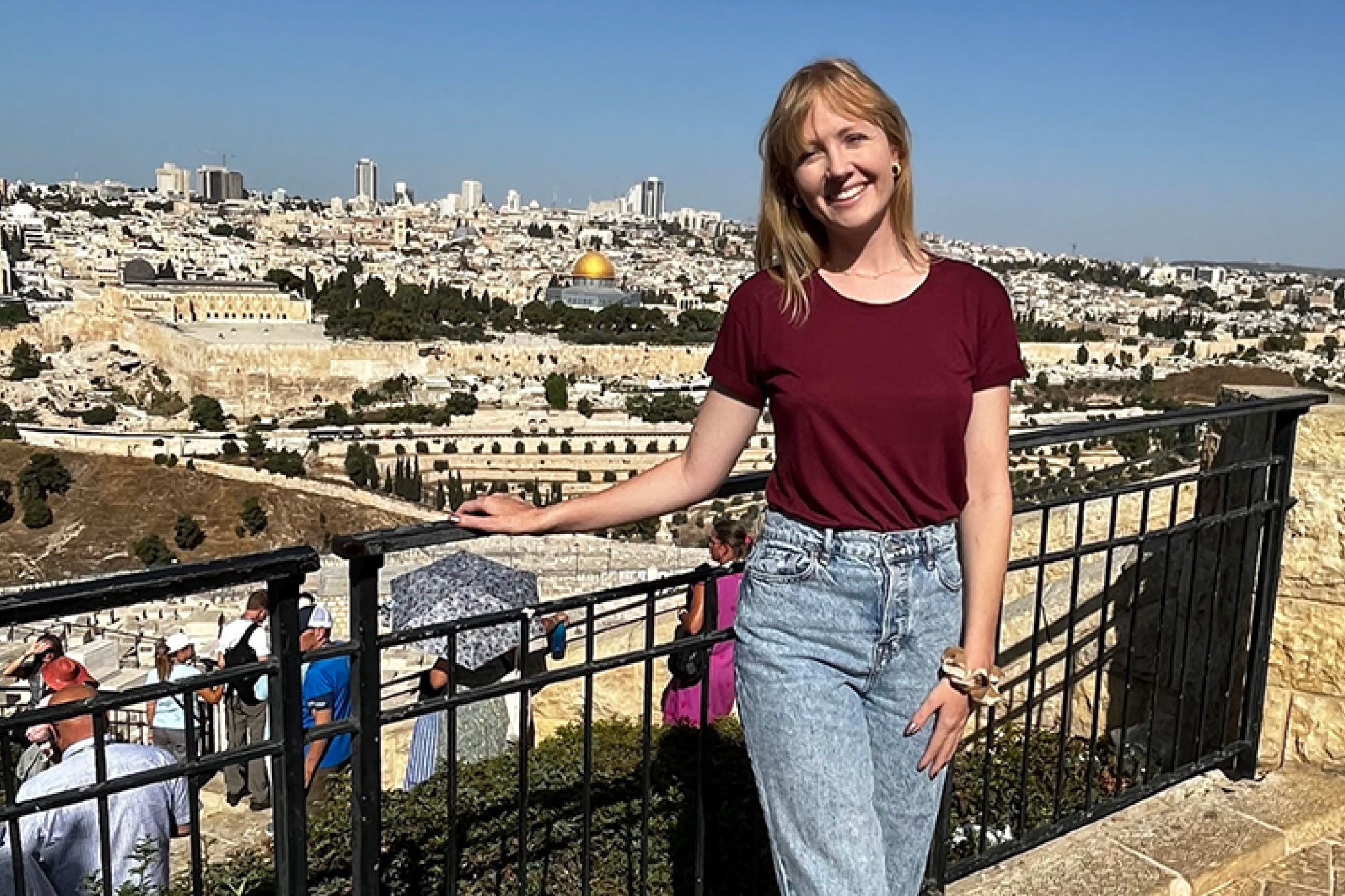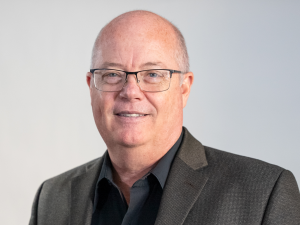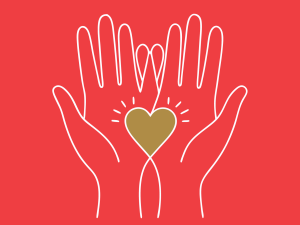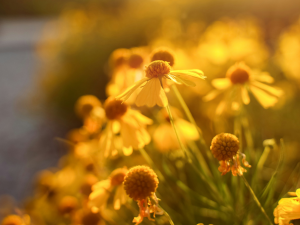Quick programming note: We recorded this episode before recent events unfolded. It doesn’t address the current war in the Middle East but we believe this episode still holds value so we’re sharing it today as planned. Then we’ll be back with an added bonus episode this week with a family therapist on how to care for ourselves in an emotionally taxing world and how to address what’s going on with our kids. Be sure to subscribe to the Do Gooders Podcast wherever you listen to podcasts and you’ll be the first to know when that episode drops this week.
What would it mean to you to see the scenes of Scripture, the places where Jesus walked and talked and performed miracles, right in front of you?
To survey the land and picture the people, to take in the detail of a setting we so often study?
How would it affect your understanding of the Bible?
Of the legacy you want to leave as a follower of Jesus?
Emily Anderson is here to answer these questions after recently returning from the Holy Land.
Emily is the Social Media Editor for Caring Magazine.
So while she’s usually behind the screen, interacting with you on our Facebook, Instagram or Pinterest, today she’s sharing more about her time seeing the setting of Scripture come to life.
And she’s reflecting with us on what the experience means for her moving forward.
After the episode, be sure to follow Caring on Instagram and send us a DM with your favorite Holy Land experience or what you would most want to see if you go in the future.
Show highlights include:
- Why Emily wanted to visit the Holy Land.
- What she expected from the trip.
- How she prepared for the pilgrimage.
- Where she went and what what she did.
- What she enjoyed most.
- How her experience of Scripture has changed.
Listen and subscribe to the Do Gooders Podcast now. Below is a transcript of the episode, edited for readability. For more information on the people and ideas in the episode, see the links at the bottom of this post.
* * *
Christin Thieme: Emily, welcome to the Do Gooders Podcast.
Emily Anderson: Hi, thank you for having me.
Christin Thieme: Yes, you’re so involved in the podcast all the time and interacting with everybody online that it’s fun this time around to have you in front of the mic.
Emily Anderson: Yeah, I’m excited to see my little picture on the episode graphic.
Christin Thieme: That’s right, it’s coming. Well, we are talking today about a recent trip that you took. Recently came back from the Holy Land, and I know it’s a trip that you were planning for a really long time. Why did you want to go?
Emily Anderson: I feel like it’s sometimes hard to read the Bible and actually know what it’s talking about. When they talk about the caves, I picture the caves I know, I picture caves in the Midwest or Arizona. And I only have the reference points of my own experience, my own Western American life. And I really care deeply about understanding Scripture and understanding the cultural context of Scripture. And I wanted to sort of correct some of those reference points. And to have a time to sort of meditate on Scripture, to really think about it, and to really just absorb and correct my own vision of what’s happening when I read the Bible.
Christin Thieme: Yeah. So you signed up to go on this tour. How long were you waiting? And with so much time leading up to it, how did you plan for it? What did you expect?
Emily Anderson: So I signed up for this tour, I think in 2020, it may have been 2021.
Christin Thieme: A while back.
Emily Anderson: A while back, pandemic days. And I was looking forward to doing it, but it didn’t really feel real until about three months before they started emailing me all this stuff. They emailed me the itinerary and they had a Bible reading plan. And I was like, “Oh my gosh.” And because I am a social media person, that’s my career, and I’m Gen Z, I was like, “I need to plan my outfits.” So I made a PowerPoint with all of the outfits that I was going to wear on each day.
Christin Thieme: Yes, oh my goodness. Amazing.
Emily Anderson: And then very serious things like praying and doing the Bible reading plan, but…
Christin Thieme: Awesome, yes. So what did the Bible reading plan look like then? How did you kind of mentally prepare for… Did you consider it a pilgrimage?
Emily Anderson: Yeah, I would consider it a pilgrimage. The Bible reading plan was sort of structured along the tour, so they wanted us to be familiar with the passages that we would be studying while we were there. So I did, yeah, I considered it a pilgrimage specifically sort of a lead up, an introduction as we traveled around Galilee and some of those regions. And then the ultimate pilgrimage being Jerusalem and feeling as the ancient folks did, as Jesus’s family did, coming for the High Holy Days, coming to a place that is incredibly special. And I did finally… I understood the Song of Ascents and the coming to something and it really did feel like a pilgrimage, yeah.
Christin Thieme: So can you give us a rundown of where you went, what you did?
Emily Anderson: Yeah. So we started in Tel Aviv because that is the big airport. And we went to a place called Caesarea Philippi, which is where there’s ruins of King Herod’s castle. Recently, this is super new, they excavated a prison where they believe Paul was actually imprisoned. So that was really interesting to see. And then we sort of moved north, we ended up in Galilee and we visited some of the ruins around there, which is Jesus’s home base was Capernaum, and Magdala was where Mary Magdalene was from. So we got to see where he performed most of his miracles. And then we went up into the hills sort of toward Lebanon where we got to see some pagan ruins, pagan ruins of a temple. And Jesus delivered sort of a sermon there, so we got to talk about that. And the way Jesus saw himself conversing with sort of the Greco-Roman influences of the day, so a contrast between that. And then we went down to the Dead Sea to do some tourist things. And then we headed through the wilderness, back up into Jerusalem and we spent the rest of our time there.
Christin Thieme: Nice. So after so much anticipation and looking forward to and preparing for this time, what did you enjoy the most?
Emily Anderson: Well, the not deep answer is the food. The food was really, really good, every breakfast there was just a full honeycomb on display that you could just scrape off some honey.
Christin Thieme: Amazing.
Emily Anderson: That was really good. But I feel like I got what I was wanting out of it, which I feel like doesn’t happen that often. It’s not often that you’re anticipating something and you expect it to be really special, and then it is.
Christin Thieme: Yeah.
Emily Anderson: Usually you’re let down, but I really did get to experience what I was looking for and to sort of correct those reference points like I was talking about earlier. And it was just so special to look at the Sea of Galilee on this rocky beach. And there’s a little sign there that says, this is a holy place. And it’s the beach where Jesus came to Peter after his resurrection and cooked him breakfast. And that is just such a sweet story to me about redemption and community, and what the kingdom of Heaven is really supposed to look like, which is us sharing a meal with the creator of the universe. And to just look at it and to know that that happened. There was a guy here named Peter, and there was another guy named Jesus. And they did something that we do every day, they ate breakfast and there’s just a little sign to let you know.
Christin Thieme: Yeah, kind of surreal.
Emily Anderson: Yes.
Christin Thieme: So you wrote a reflection for Caring, which you’re going to share with us in a moment on the podcast, but I particularly love this one line that I wanted to call out here. You said that your guide repeatedly said, “You used to read the Bible in black and white, but now it will be in Technicolor.” Does that feel true for you?
Emily Anderson: It really does. I feel like my images of Scripture were really… they were stunted. They were sort of locked into the picture Bible that I had growing up, Jesus in his purple robes.
Christin Thieme: Yeah, and the felt board.
Emily Anderson: Yes. So very cartoony and not really fully fleshed out. And now when I read Scripture and I see in my mind the places and the topography and the buildings, it is much more vivid to me now. It’s almost also like it was a 2D picture Bible and now it’s a 3D model. It’s real and full and all the senses engaged.
Christin Thieme: Yeah, definitely. So we’re coming up on Christmas. How do you think your celebration of Jesus’ birth will be different this year?
Emily Anderson: Well, okay, I forgot to mention, when we were going, we actually did stop in Bethlehem. And we did get to look out over the fields where the angels came to the shepherds, and we went into some caves that were mangers from the time. And I just think at Christmas, it’s so special to think about God incarnate, that is it. And when you think about a cave, a smelly sort of cave, and you think about ordinary people doing their jobs, and at night and then something miraculous happens, and it’s just such a special gift that God does want to intervene in our ordinary lives. This was ordinary for them, this was every day.
And I think that when we let the Bible become stories and we put that distance between us, we forget that God has always and will always work through ordinary people. And he’s always looking to surprise and amaze us and to just show us how much he loves us. And the epitome of that is Christmastime and those angels coming through and singing and announcing a savior to people who were just hanging out, just watching sheep. And yeah, so I think that’s a really special perspective to have this Christmas.
Christin Thieme: Yeah, love it. Well, you are going to share your reflection with us, “What a Jerusalem trip taught me about loving others in my ordinary life.” So thank you for that, and take it away.
Read Emily’s reflection piece here.
Additional resources:
- Read Emily Anderson’s Holy Land reflection piece, “What a Jerusalem trip taught me about loving others in my ordinary life.”
- Get inside the Caring Magazine Scripture Study Collection and find a suite of free, downloadable Bible studies to guide you through topics from New Beginnings Through Forgiveness, to Understanding our Imago Dei or Life Hacks From David.
Listen and subscribe to the Do Gooders Podcast now.












